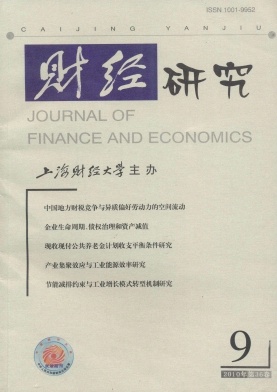大规模诚信缺失为何出现在转轨时期——一个基于微观行为的解释框架
财经研究 2010 年 第 36 卷第 09 期, 页码:113 - 123
摘要
参考文献
摘要
"道德滑坡"论和"制度缺陷"论不曾深入讨论大规模诚信缺失为何与"转轨"这一动态过程联系在一起。文章从转轨的两大特征(即市场规模扩大和法治逐步加强)出发,基于交易个体的微观行为讨论了从关系型治理社会向法治型治理社会转轨过程中诚信缺失的原因:市场规模扩大和法治加强,都对关系型治理有破坏作用,使交易对长期关系的依赖程度下降,削弱了基于长期关系的诚信行为,法治加强虽可强化短期关系中的诚信行为,但市场扩大却会弱化短期关系中的诚信行为,加之法治建设通常会滞后于市场实践,结果转轨时期短期关系中的诚信行为总的来说被弱化了。文章还逻辑地推导出,加快发展市场经济和提高政府管理能力对于治理诚信缺失非常重要。
[1]阿维纳什.迪克西特.法律缺失与经济学:可供选择的经济治理方式[M].北京:中国人民大学出版社,2007.
[2]戴维斯,诺斯.制度变迁的理论:概念与原因[A].科斯等.财产权利与制度变迁[C].上海:上海人民出版社,1994.
[3]鹤光太郎.用“内生性法律理论”研究法律制度与经济体系[J].比较,2003,(8):117-128.
[4]诺斯.制度、制度变迁与经济绩效[M].上海:上海三联书店,1994.
[5]诺斯.理解经济变迁的过程[M].北京:中国人民大学出版社,2008.
[6]皮斯托,凯南,克莱因赫斯特坎普,等.法律演进与移植效果:六个法律移植国家中公司法发展的经验[J].比较,2002,(2):74-84.
[7]钱颖一.市场与法治[J].经济社会体制比较,2000,(3):1-11.
[8]邵道生.社会的发展与道德的衰退[J].中国社会科学,1994,(3):11-15.
[9]舒尔茨.论人力资本投资[M].北京:北京经济学院出版社,1990.
[10]卫兴华,焦斌龙.诚信缺失的成因分析及其治理[J].教学与研究,2003,(4):15-20.
[11]杨瑞龙.关于诚信的制度经济学思考[J].中国人民大学学报,2005,(2):8-14.
[12]张养志,郑国富.中亚五国经济体制的新制度经济学分析[J].俄罗斯中亚东欧研究,2007,(1):46-50.
[13]Abreu D.Extremal equilibria of oligopolistic supergames[J].Journal of Economic The-ory,1986,39:191-225.
[14]Akerlof G.The market for“lemons”:Quality uncertainty and the market mechanism[J].The Quarterly Journal of Economics,1970,84:488-500.
[15]Greif A.Contract enforceability and economic institutions in early trade:The maghribitraders’coalition[J].The American Economic Review,1993,83(3):525-548.
[16]Greif A.Onthe political foundations of the late medieval commercial revolution:Genoaduring the twelfth and thirteenth centuries[J].The Journal of Economic History,1994,54(2):271-281.
[17]Greif A.Contracting,enforcement,and efficiency:Economics beyond the law[Z].An-nual World Bank Conference on Development Economics,1997.
[18]Greif A.The fundamental problemof exchange:Aresearch agenda in historical insti-tutional analysis[J].European Reviewof Economic History,2000,4(3):251-284.
[19]Greif A,David D Lattin.Atheory of endogenous institutional change[J].American Po-litical Science Review,2004,98(4):633-652.
[20]Bennett S.Interest rate policy in central and easter Europe:The influence of monetaryoverhangs[R].I MF Working Papers 68,1992.
[21]Bowles S,Hwang S.Social preferences and public economics:Mechanismdesign whensocial preferences depend onincentives[J].Journal of Public Economics 2008,92(8-9):1811-1820.
[22]Coffee J.The future as history:The prospects for global convergencein corporate gov-ernance and its i mplications[J].Northwestern University Law Review,1999,93:641-707.
[23]Elilison G.Corporation in the prisoners dilemma with anonymous random matching[J].Reviewof Economic Studies,1994,61:567-588.
[24]Ostrom E.Governing the commons:The evolution of institutions for collective action[M].Cambridge University Press,1990.
[25]Kandori M.Social norms and community enforcement[J].Reviewof Economic Studies,1992,59:63-80.
[26]Pistor K Keinan Y,Kleinheisterkamp J,West M.Legal evolution and the transplanteffect:Lessons from corporate law development in six transplant countries[J].TheWorld Bank Research Observer,2003,18(1):89-112.
[27]Williamson O.Transaction cost economics:The governance of contractual relations[J].Journal of Lawand Economics,1999,22:136-178.
[2]戴维斯,诺斯.制度变迁的理论:概念与原因[A].科斯等.财产权利与制度变迁[C].上海:上海人民出版社,1994.
[3]鹤光太郎.用“内生性法律理论”研究法律制度与经济体系[J].比较,2003,(8):117-128.
[4]诺斯.制度、制度变迁与经济绩效[M].上海:上海三联书店,1994.
[5]诺斯.理解经济变迁的过程[M].北京:中国人民大学出版社,2008.
[6]皮斯托,凯南,克莱因赫斯特坎普,等.法律演进与移植效果:六个法律移植国家中公司法发展的经验[J].比较,2002,(2):74-84.
[7]钱颖一.市场与法治[J].经济社会体制比较,2000,(3):1-11.
[8]邵道生.社会的发展与道德的衰退[J].中国社会科学,1994,(3):11-15.
[9]舒尔茨.论人力资本投资[M].北京:北京经济学院出版社,1990.
[10]卫兴华,焦斌龙.诚信缺失的成因分析及其治理[J].教学与研究,2003,(4):15-20.
[11]杨瑞龙.关于诚信的制度经济学思考[J].中国人民大学学报,2005,(2):8-14.
[12]张养志,郑国富.中亚五国经济体制的新制度经济学分析[J].俄罗斯中亚东欧研究,2007,(1):46-50.
[13]Abreu D.Extremal equilibria of oligopolistic supergames[J].Journal of Economic The-ory,1986,39:191-225.
[14]Akerlof G.The market for“lemons”:Quality uncertainty and the market mechanism[J].The Quarterly Journal of Economics,1970,84:488-500.
[15]Greif A.Contract enforceability and economic institutions in early trade:The maghribitraders’coalition[J].The American Economic Review,1993,83(3):525-548.
[16]Greif A.Onthe political foundations of the late medieval commercial revolution:Genoaduring the twelfth and thirteenth centuries[J].The Journal of Economic History,1994,54(2):271-281.
[17]Greif A.Contracting,enforcement,and efficiency:Economics beyond the law[Z].An-nual World Bank Conference on Development Economics,1997.
[18]Greif A.The fundamental problemof exchange:Aresearch agenda in historical insti-tutional analysis[J].European Reviewof Economic History,2000,4(3):251-284.
[19]Greif A,David D Lattin.Atheory of endogenous institutional change[J].American Po-litical Science Review,2004,98(4):633-652.
[20]Bennett S.Interest rate policy in central and easter Europe:The influence of monetaryoverhangs[R].I MF Working Papers 68,1992.
[21]Bowles S,Hwang S.Social preferences and public economics:Mechanismdesign whensocial preferences depend onincentives[J].Journal of Public Economics 2008,92(8-9):1811-1820.
[22]Coffee J.The future as history:The prospects for global convergencein corporate gov-ernance and its i mplications[J].Northwestern University Law Review,1999,93:641-707.
[23]Elilison G.Corporation in the prisoners dilemma with anonymous random matching[J].Reviewof Economic Studies,1994,61:567-588.
[24]Ostrom E.Governing the commons:The evolution of institutions for collective action[M].Cambridge University Press,1990.
[25]Kandori M.Social norms and community enforcement[J].Reviewof Economic Studies,1992,59:63-80.
[26]Pistor K Keinan Y,Kleinheisterkamp J,West M.Legal evolution and the transplanteffect:Lessons from corporate law development in six transplant countries[J].TheWorld Bank Research Observer,2003,18(1):89-112.
[27]Williamson O.Transaction cost economics:The governance of contractual relations[J].Journal of Lawand Economics,1999,22:136-178.
引用本文
董志强, 汤灿晴. 大规模诚信缺失为何出现在转轨时期——一个基于微观行为的解释框架[J]. 财经研究, 2010, 36(9): 113–123.
导出参考文献,格式为:





 6780
6780  4387
4387

